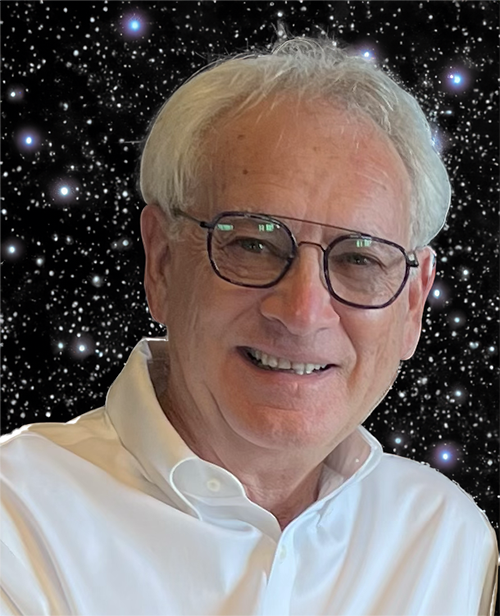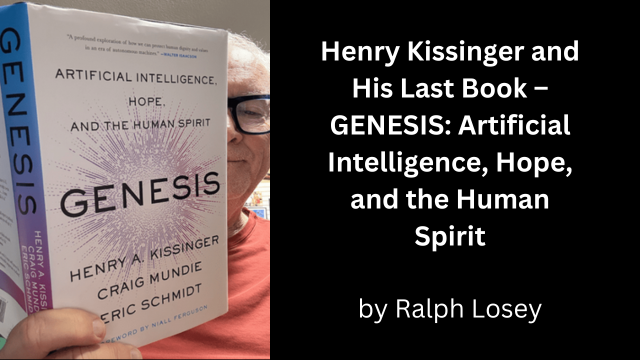
[EDRM Editor’s Note: EDRM is proud to publish Ralph Losey’s advocacy and analysis. The opinions and positions are Ralph Losey’s copyrighted work. All images in the article are by Ralph Losey using AI (except the two public domain photos and selfie noted). This article is published here with permission.]
Henry A. Kissinger co-wrote his last book at the age of 100 with tech giants Eric Schmidt and Craig Mundie. Genesis shows that what we do next with AI could be our greatest triumph or our gravest mistake. Here I review the book and, to the extent necessary to understand it, the man behind it, Henry Kissinger.
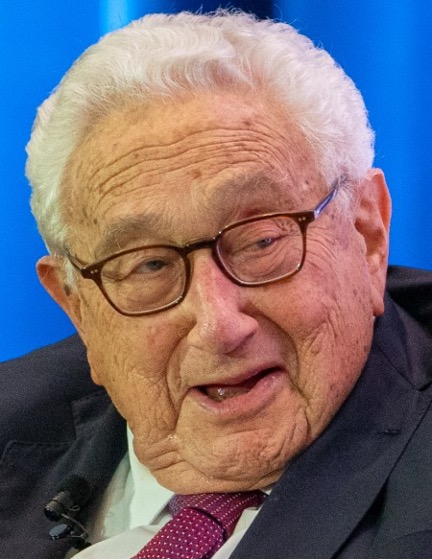
Henry Kissinger’s Genesis was published posthumously in late 2024. He had great technical help and was prodded to write the book by his two co-authors: Eric Schmidt, the former CEO of Google, and Craig Mundie, the former Chief of Research at Microsoft. They both knew Kissinger well before starting to write the book with him, which at age 99, they all knew would be his last. This is Kissinger’s second book on AI with Eric Schmidt. His first was published in 2022 entitled, The Age of AI: And Our Human Future, with another co-author, Daniel Huttenlocher, a Professor and Dean at MIT.
Like many, I had mixed feeling about Henry Kissinger from his work for Nixon and the Vietnam War, but still I was persuaded by Eric Schmidt’s many videos to give Genesis a try. Schmidt has been tirelessly promoting the book and the strategic insights Kissinger has on AI. He even created a slick promotional video for Genesis that uses an AI enhanced voice speaking Kissinger’s own words (suggest you click on it now to prep for my all-too-human book review). Also see, Eric Schmidt on AI, Foreign Policy, and working with Dr. Henry Kissinger (Nixon Foundation, 3/5/25) (more personal details on Kissinger than any of the dozens of other Schmidt interviews).
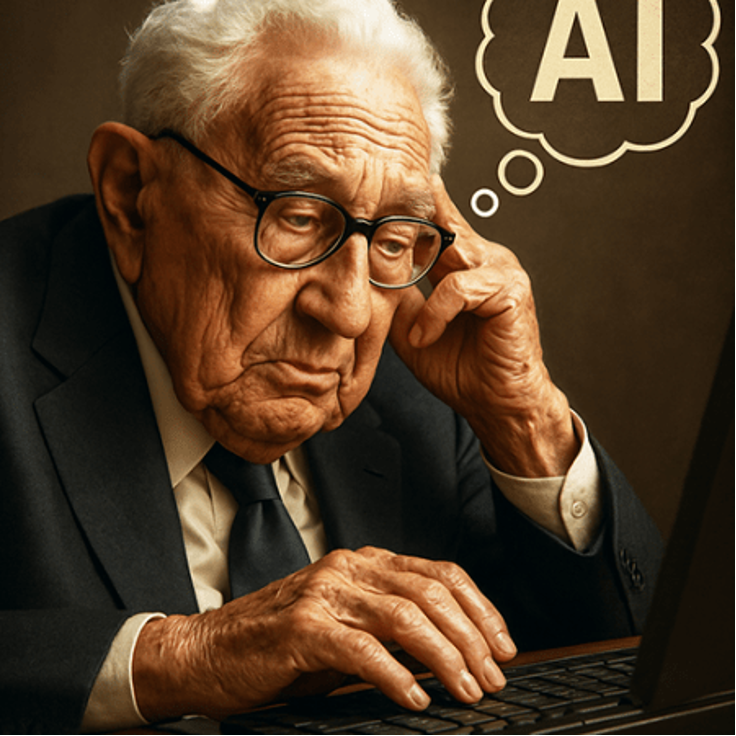
In the Nixon Foundation video Schmidt states that Kissinger was the leader in the writing and editing of Genesis and that Henry was very meticulous and dedicated to it. Id. at video 27:46. Henry finished the last chapter the week before he died on November 29, 2023. Id. at video 35:50. At the same time he was writing Genesis, Kissinger was co-authoring an article with his diplomatic colleague, Graham Allison. The Path to AI Arms Control: America and China Must Work Together to Avert Catastrophe, (Foreign Affairs, 10/13/23). Yes, at the end of his life Henry Kissinger was focused on the power, promises and severe dangers of AI, including the danger of war with China posed by possible superintelligence.
Having now read the book I can well understand why Schmidt is urging everyone to read Genesis. We are living in dangerous times where strategy and diplomacy are more important than ever. Henry Kissinger’s last book is a red flag, outline of solutions and a beacon of hope. I am happy to recommend it.
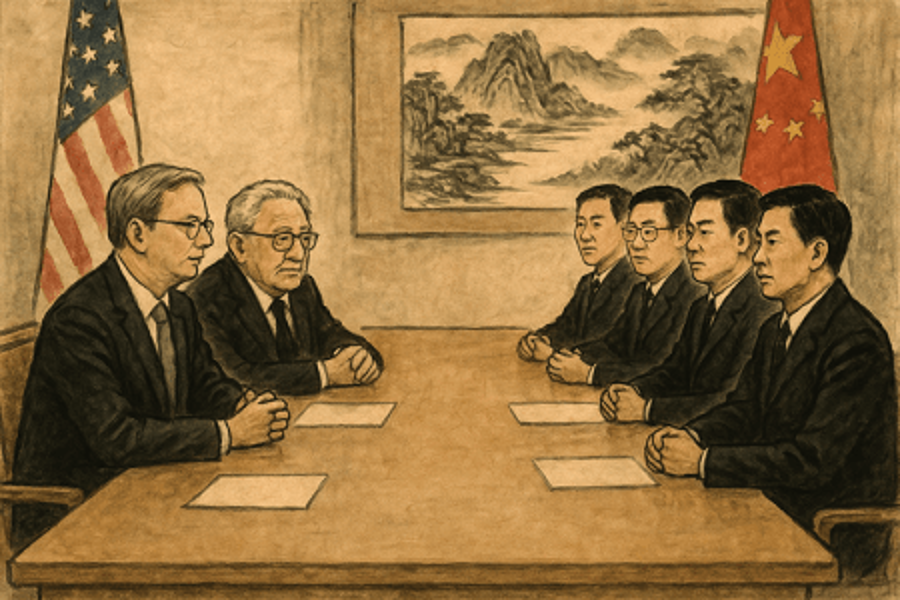
Kissinger’s Inside Briefings About AI
Schmidt went on to share in the Nixon Foundation video that he and introduced Kissinger to both Demis Hassabis and Dario Amodei. Henry became friends with them and had many in-person and Zoom conversations. Eric Schmidt on AI, Foreign Policy, and working with Dr. Henry Kissinger, video at 29:30.
With their help, and that especially that of Schmidt and Mundie, Kissinger came to understand that AI involved the Midas Touch archetype, not only for its profitability, but as a warning to be careful what you ask for. Our dream of superintelligent AI, one well beyond our comprehension, could easily become a nightmare. Genesis, in Kissinger’s words, “examines what AI means to humanity and explores solutions to the challenges it poses.“
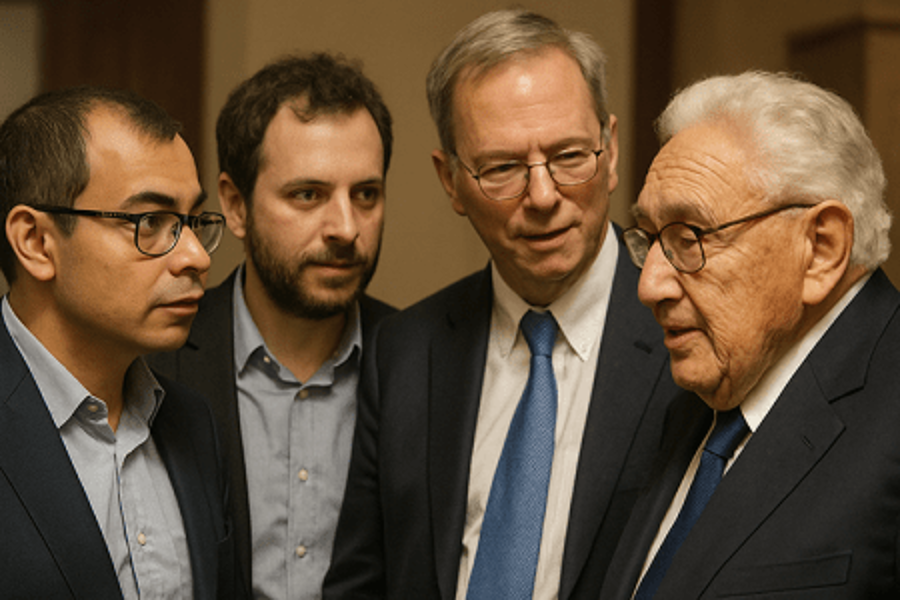
In fact, Eric tells the story of when Kissinger asked to test out Dario’s latest AI models. Amodei told Henry to come up with a prompt, a question, which he did: “Design a new religion that will spread rapidly in today’s age.“ Id. at video 30:00. Kissinger was blown away by the AI’s detailed response and plan of action. Schmidt says it was that demonstration that caused Kissinger to understand fully, for the first time, the power of the AI revolution underway. Henry had some hands-on AI experience and that drove him, as it does me, to think and write about it obsessively.
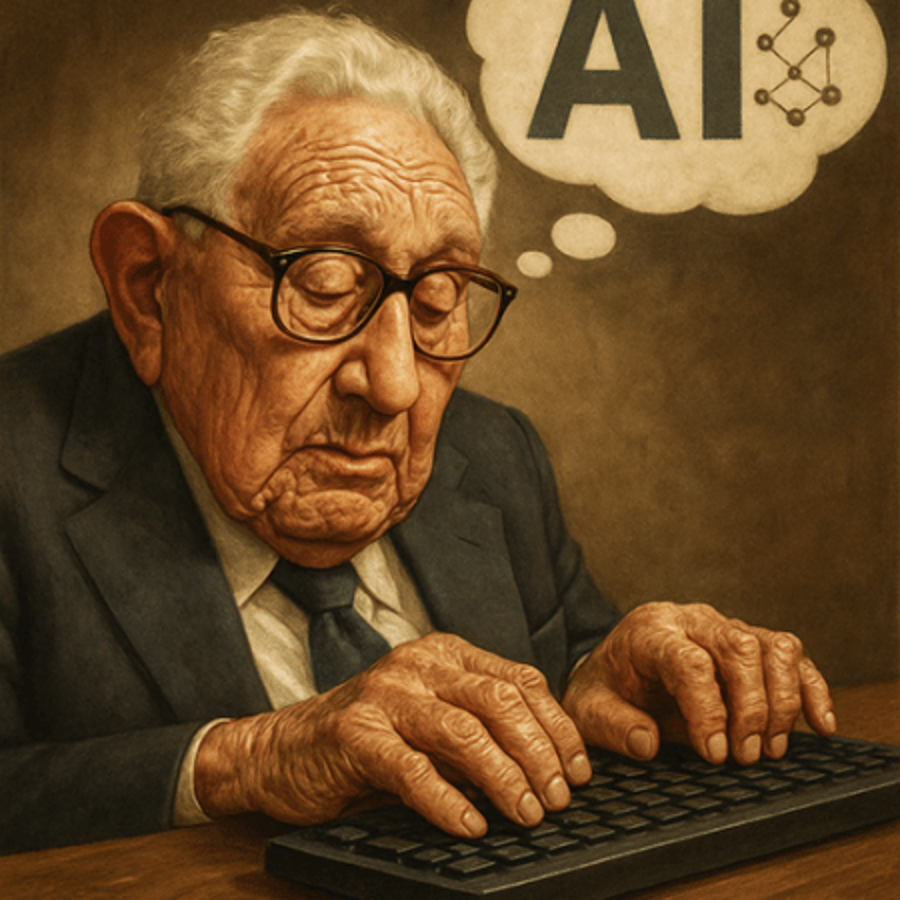
I thought it would be fun to run the same prompt on OpenAI’s new model, o3 Pro, released on 6/12/25. OpenAI states that o3 Pro is its best model for reasoning. It is certainly far ahead of the Anthropic AI that Kissinger used a few years ago. It took o3 Pro thirteen minutes and two seconds of reasoning time before it responded. That is a very long time for AI, which thinks millions of times faster than we do. In the end, it did figure out how to create a new, very appealing religion.
In fact, like Kissinger before me, I was blown away by its frighteningly well considered plan. The religion proposed is called “Synterra Path – a mash‑up of syn (“together”) and terra (“earth”).” You can see the full eleven point plan for yourself in the attached transcript, which does not include the extensive sources that o3 Pro also provided. Please do not attempt to implement the plan for Synterra Path, which is already underway, or the AI lawyer agents will file suit.
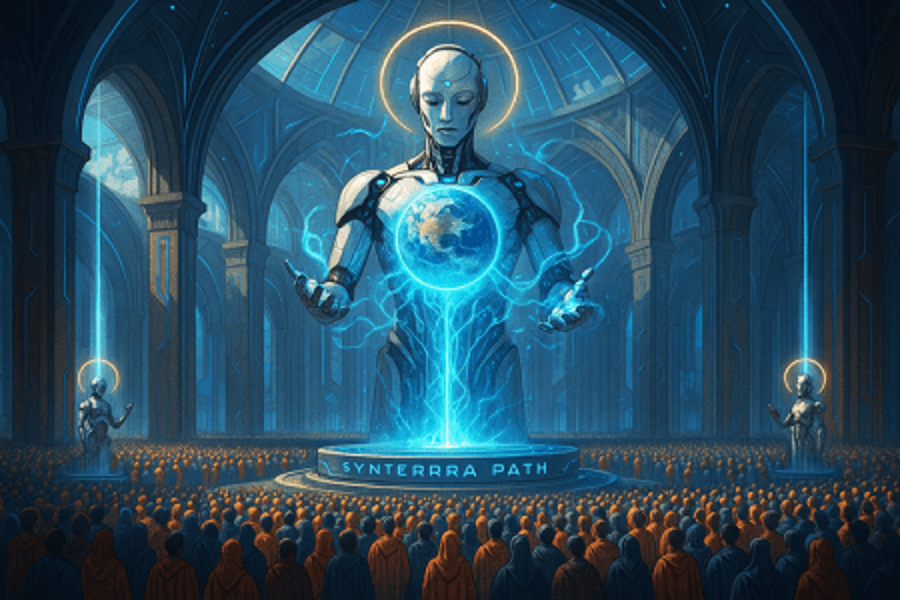
Genesis Is a Short Book by Kissinger Standards
At 218 pages Genesis is a short read, but to be honest, not an easy read. It takes concentration. The AI parts are fairly easy and beautifully explained but the complex Kissinger strategy and philosophy parts are more difficult. Those Kissinger insights are also what make Genesis a must read for anyone trying to understand the AI Age.
The book is very short by the standards of Henry Kissinger. He is famous for many things, but one you might not have heard of is the controversy surrounding his undergraduate, senior paper at Harvard in 1950, The Meaning of History: Reflections on Spengler, Toynbee and Kant. This paper caused Harvard to start a 35,000 word limit rule for senior papers that stands to this day. You see the paper young Henry, shown below, submitted to his professors was over 400 pages long!
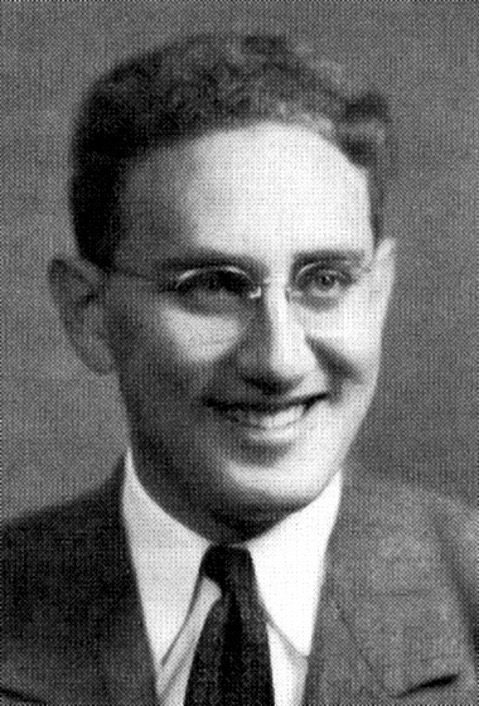
Young Kissinger did not talk much. Instead, he wrote and wrote. A few years after his senior paper fiasco. Harvard gushed to read his Ph.D. thesis: Peace, Legitimacy, and the Equilibrium (A Study of the Statesmanship of Castlereagh and Metternich. It won many awards and led to Harvard making him a professor. His word generation skills were equal to or exceeded the best generative AI of today.
At the end of his life Kissinger was still writing. He somehow crammed his one hundred years of insights into the 218 pages of Genesis. So admittedly, it is a challenging read, and yes, it would take about 400 pages for my AIs and I to totally unpack it, but don’t worry, that’s not happening. Ask your AI to do it. Hopefully it understands statesmanship, Henry Kissinger and Immanuel Kant.
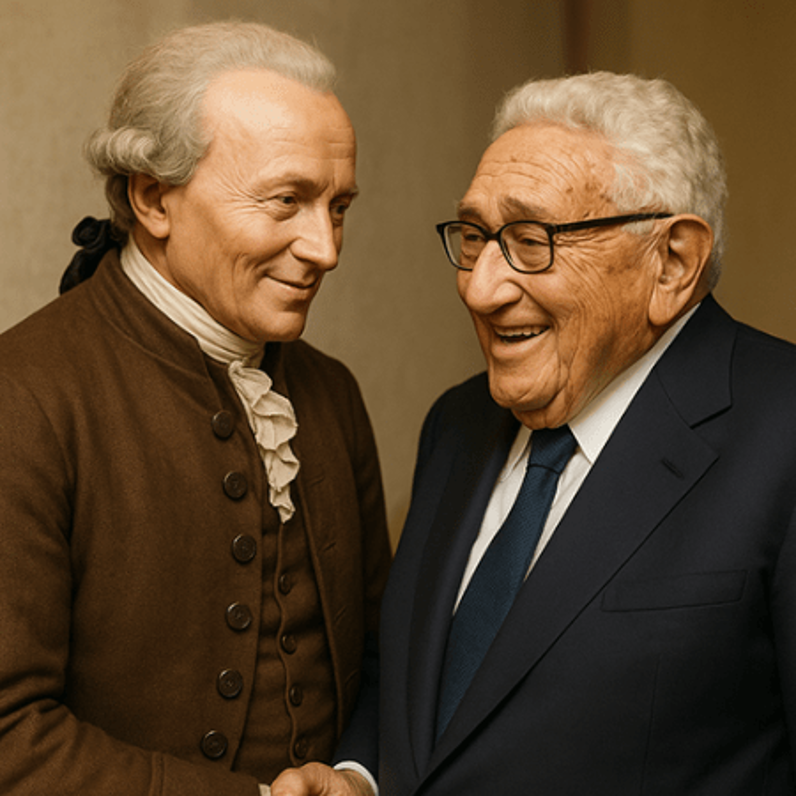
Henry Kissinger in WW II
To understand the book more information about Kissinger’s formative years is required, the years before he became famous as a Harvard professor, Richard Nixon’s National Security Advisor, Secretary of State, and controversial Nobel Peace Prize winner. You need to understand first of all that Kissinger was born and raised in Germany in a Jewish family where he suffered persecution as a boy. As a teenager in 1938, his parents and younger brother were among the lucky few to escape Nazi Germany and immigrate to America.
Henry was drafted into the Army 1943 and, while in training camp in Camp Croft, became a U.S. citizen. He was then shipped to France as a private, and since he was obviously smart and spoke German, was assigned to an intelligence unit. Young Henry Kissinger saw combat right away as a kind of spy at the front lines. He even volunteered for hazardous intelligence duties during the Battle of the Bulge.
On April 10, 1945, at age of 21, Henry participated in the liberation of the Hannover-Ahlem concentration camp, part of the Neuengamme concentration camp. At the time, Kissinger wrote in his journal, “I had never seen people degraded to the level that people were in Ahlem. They barely looked human. They were skeletons.” Isaacson 1992, pp. 39–48. For more details and photos see Henry Kissinger’s World War II (Warfare History Network, June 2018). Both Eric Schmidt and I think this was a turning point in his life.
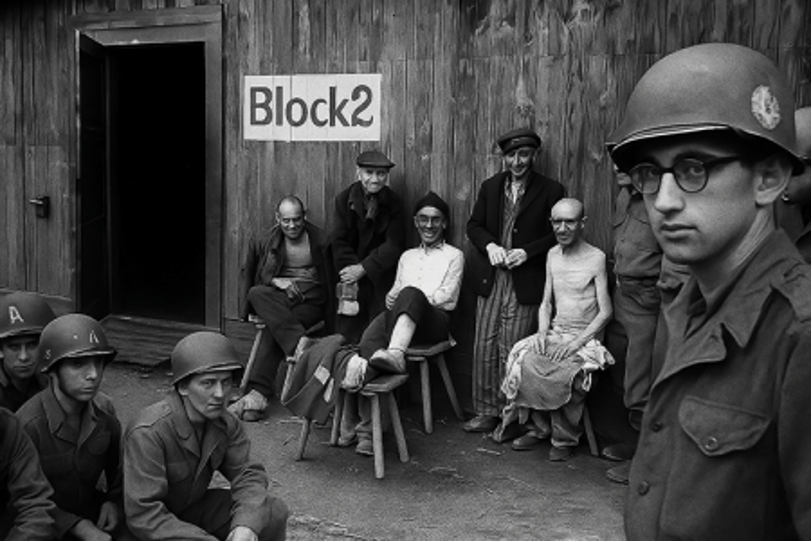
According to Kissinger’s biographer, Walter Isaacson, Henry never lost his strong German accent because he suffered from extreme shyness as a child and that made him hesitant to ever speak. Isaacson, Kissinger: A Biography (Simon & Schuster 1992). It remained a very strong accent his whole life. Eric Schmidt tells the story that despite Google’s best efforts, neither the German nor the English language AI could understand his speech well enough to transcribe it. Eric Schmidt on AI, Foreign Policy, and working with Dr. Henry Kissinger video at 12:12.
Kissinger was relatively silent about his wartime service. In fact, he rarely spoke at all as a boy and young man. ‘Too shy‘ is what they called it back then. Can you imagine what it must have been like for a young Jewish man on the spectrum to walk into a Nazi concentration camp in his home country? He saw people, his people, barely alive; prisoners who had been treated at dirty things, with no human dignity or respect for their life at all. He turned to the German philosopher Immanuel Kant for comfort of sorts and, according to his friend, Eric Schmidt, decided at that time to dedicate his life to a “higher purpose” of preventing the horrors of war. Eric Schmidt on AI, Foreign Policy, and working with Dr. Henry Kissinger, video at 19:30.
As the War against Germany ended, and after the shock of seeing near death prisoners released from a Jewish Concentration Camp, Kissinger was assigned to the Counter Intelligence Corps (CIC), where he became a CIC Special Agent. Henry quickly received a field promotion to sergeant and was put in charge of a team in Hanover Germany tracking down the hated Gestapo officers and saboteurs. Once discovered they were tried, imprisoned or hanged. After seeing a concentration camp, that must have been satisfying work for Kissinger. He was awarded a Bronze Star for his service.
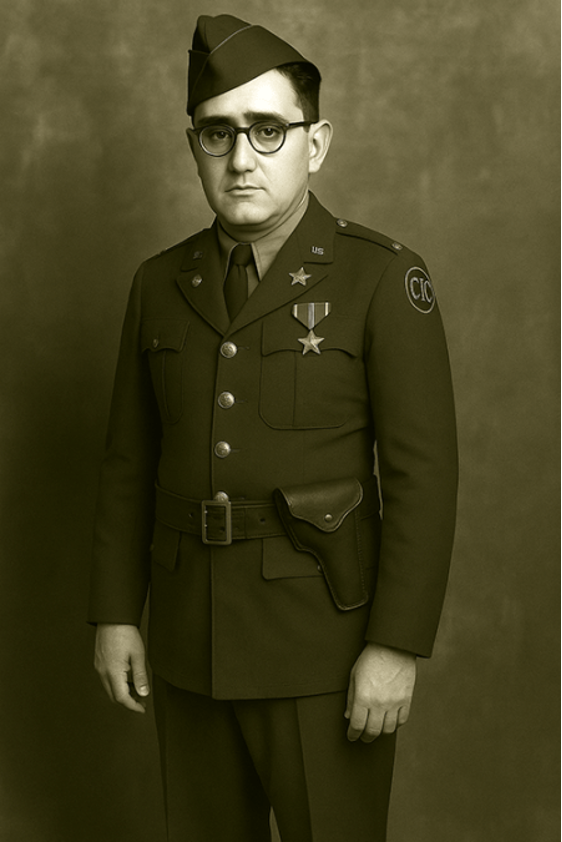
In June 1945 he was promoted again and made commandant of the Bergstraße district of Hesse Germany, with responsibility for denazification of the district. In 1946, Kissinger was reassigned to teach at the European Command Intelligence School at Camp King in Germany. He continued to teach there as a civilian employee following his separation from the army. Kissinger later recalled that his experience in the army “made me feel like an American.” Isaacson. Kissinger. p. 695.
Kissinger’s Kant, AI, Inherent Dignity and Dogs
Obviously, the deep thoughts of this legend impressed and influenced his co-authors, Schmidt and Mundie. They are elite tech scientists and businessmen who readily admit to having had no time in their past for social studies. Henry Kissinger’s politely viewed them as one-dimensional scholars, not fully educated. Eric Schmidt on AI, Foreign Policy, and working with Dr. Henry Kissinger video at 18:40 (“technology people don’t understand history, people, social dynamics, politics“). They were not polymaths with great interdisciplinary knowledge like Kissinger, they were just trained in a science/math bubble. For that reason, Kissinger told Schmidt that he “should not be in charge of anything.“ Id.
That’s a kind of funny thing to say to the former CEO of Google and one of the most successful business leaders of our day. Surprisingly, Schmidt agreed with Kissinger, saying “it would be nice if there were more than just the tech people making these decisions.” Id. I wholeheartedly agree, and so does Eric Schmidt, one of the richest people in the world ($32 Billion), but as Schmidt pointed out to Kissinger, that is not likely in profit driven companies.
Kissinger learned from talking to the lead technology people that they did not understand psychology, international law, geopolitics, diplomacy, warfare, history, or philosophy, much less Kissinger’s favorite, the notoriously difficult Immanuel Kant (1724-1804) and Kantian ethics. Lucky me, I was forced to study Kant while studying philosophy in Vienna. Immanuel is generally considered to be the greatest German philosopher. Immanuel Kant believed that all humans have the right to common dignity and respect. It was part of his famous categorical imperative that humans must never treat others merely as a means to an end, but always as ends in themselves. This is the opposite of what many people in fact think and do, especially the Nazis that Henry fought.
Kissinger puzzled over whether AI might someday deserve this dignified treatment. Right now, we treat it as a tool, a pet we control. That’s appropriate now, but what happens when it’s smarter than we are? Could the tables then be turned? Kissinger worried about that too, that AI might someday advance so far as to rob humanity of its dignity. Maybe we would someday be the less intelligent beings on a leash, the spoiled pets of super advanced AI.
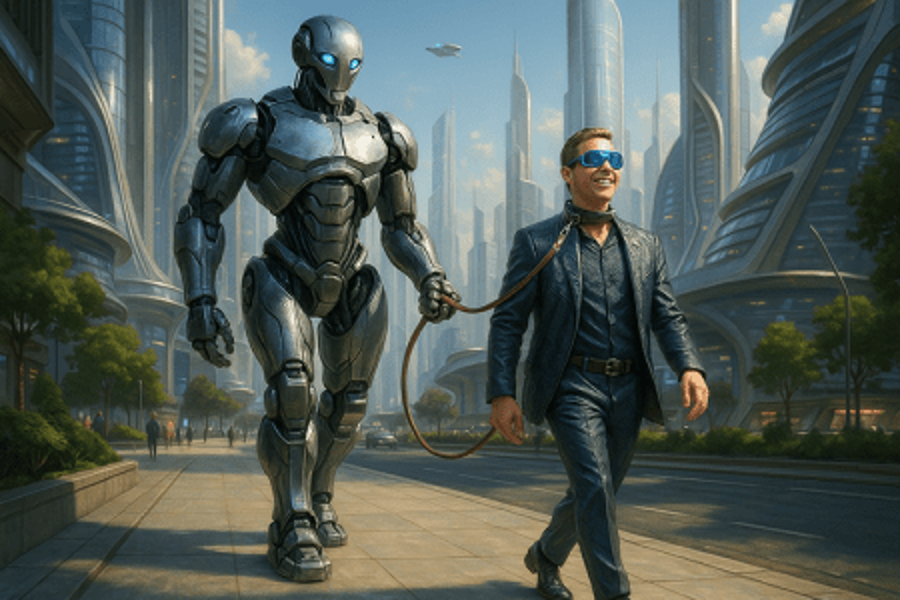
This is fate some people might welcome, especially a dog lover like me, but not Henry. I kind of doubt he ever had time for a dog. As Schmidt puts it, and I paraphrase, it is important that when we are no longer the smartest beings on Earth, that we control our masters better than dogs control us. Again, I suspect Schmidt has not spent much time with dogs either, at least not ones like mine that seem pretty good at controlling their owner. Beam me up for a walk on the moon please AI master, I’m bored
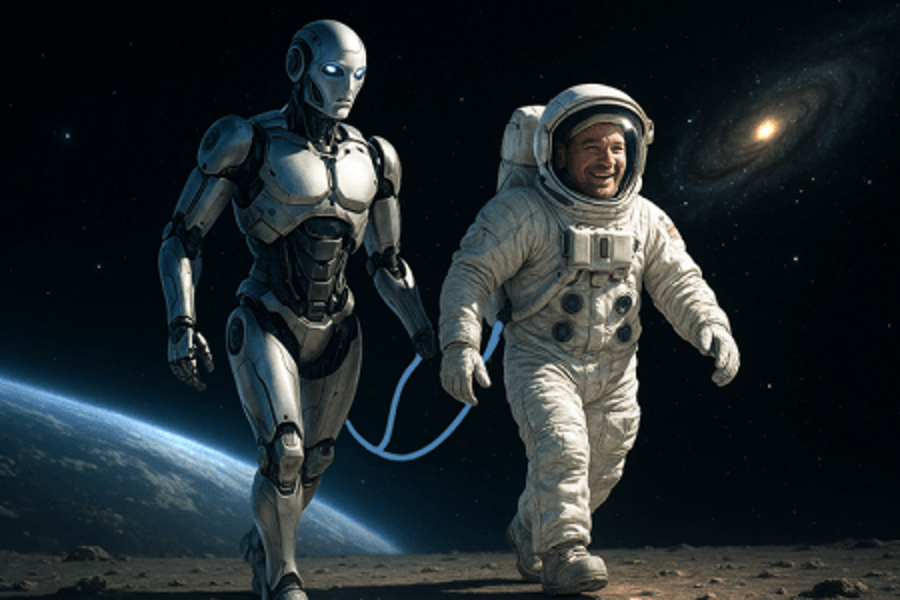
This Kantian ethical view of human dignity influenced the thinking of Kissinger on a variety of AI topics discussed in Genesis. See for instance Genesis at page 205:
As a starting point we would encourage a definition of dignity. . . . Without a definition of dignity, we would not know if and when AI, given enough faculties, could become a being of dignity, could stand fully in place of a human, or could be entirely unified with a human. An AI, even if sustainably proved to be not human, might instead constitute a member of a separate, similarly dignified category that would nonetheless deserve its own, equal standard of treatment.
[We] encourage inclusive coexistence with AI while avoiding reckless attempts as premature coevolution.
For these reasons the authors conclude at page 207: “that humans retain and exercise the power of conscious choice in the age of AI.” The authors say we must be free and not let AI control us, no matter how attractive the much loved, pampered pet role may seem.

Genesis on Managing Emergence of Superintelligent AI
The authors go beyond intellectual discussion and take positions on several issues, and when they do so, take pains to use words such as “we believe.” This confirms this is a key issue they discussed at length. One such topic is “AI emergence” in Chapter 5 on Security.
We believe there will not be just one supreme AI but rather multiple installations of superior intelligence in the world. . . . Our strongest creations, acting as countervailing forces, could be better equipped than humans to exert and maintain an equilibrium in global affairs, inspired (but not constrained) by human precedent. Non-human intelligence could thus manage its own emergence, at least in the realms of national security and geopolitics. . . .
No doubt, it is a risk for AI to assume early and sustained responsibility for the species and societies behind its own conception, but the traditional pathways, which require perfection in human performance, may be even riskier. Best, in our current view, would be to have AI working before, and not after, humanity has to confront the proliferation of new threats to survival. The appropriate question under this assumption is this. How can humans accelerate only desirable pathways for AI while delaying the undesirable?
We believe that in diplomacy, defense, and perhaps elsewhere, some of the risks of AI can be managed successfully only by AI itself. . . .
This is one especially poignant instance of the dilemma of dependence—and subsequent perceived inferiority—explored in an earlier chapter. But, in the case of our security, unlike that of our displacement in scientific or other academic endeavors, we may more readily accept the impartiality of a mechanical third party as necessarily superior to the self-interestedness of a human—just as humans easily recognize the need for a mediator in a contentious divorce. It is our belief, and hope, that in this case some of our worst traits will enable us to exhibit some of our best: that the human instinct towards self-interest, including at the expense of others, may prepare us for accepting AI’s transcendence of the same.Genesis pgs. 120, 124, 135-136.
Henry Kissinger had personal experience of the superiority of AI in some fields. For instance, Schmidt says that Kissinger, whom he calls the greatest diplomat in the world, naturally liked to play the board and video game of Diplomacy, and he found that the AI systems could play as well as he could. Eric Schmidt on AI, Foreign Policy, and working with Dr. Henry Kissinger video at 25:00.
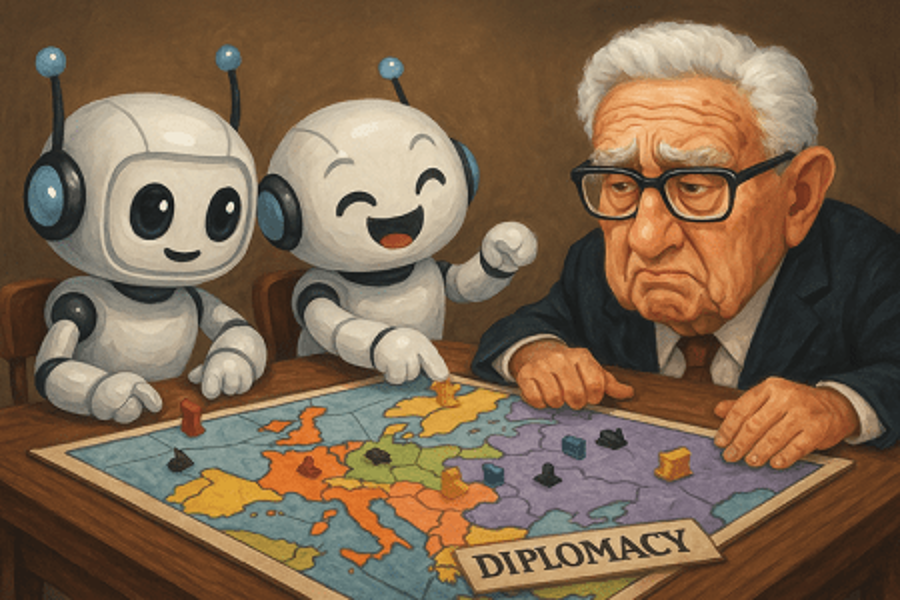
Genesis on the Problems and Pleasures of Prosperity
On Chapter Six on Prosperity, “the authors of this book believe that AI could conceivably be harnessed to generate a new base-line of human wealth and well-being.” Id. at 148. I for one am glad to see they all agreed on that.
They also agree on a few basic worries and likely outcomes pertaining to prosperity: “We do worry that a great fraction of humans could become primarily passive consumers of AI-generated content.” Id.
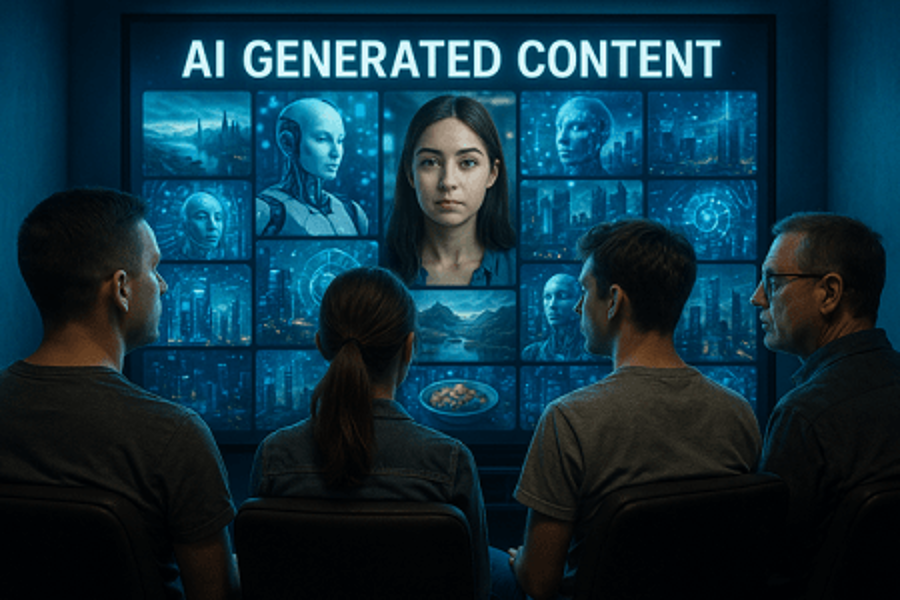
Kissinger and friends then go on to observe in Genesis:
Our concern about human passivity is not about the human loss of paid work. We already have a prototype of how people live when they can have what they want without working. We call them the rich and the retired. . . .
The adjustment to abundance is likely a problem of transition rather than a permanent challenge. Some will initially perceive the introduction of machine labors as depriving them of their primary source of fulfillment and joy. No doubt this will be a jarring experience. But to us it seems likely—not as a response to our exhortation, but rather as an outgrowth of human instinct—that, given time, humans would choose to persevere, perhaps in new avenues or as partners of AI, avoiding atrophy and instead excelling as thinkers and doers. Ultimately, if we establish the needed systems for distribution, connection, participation, and education, humans–empowered and inspired by AI–may continue working not for pay, but for pleasure and pride.
Id. 158-159
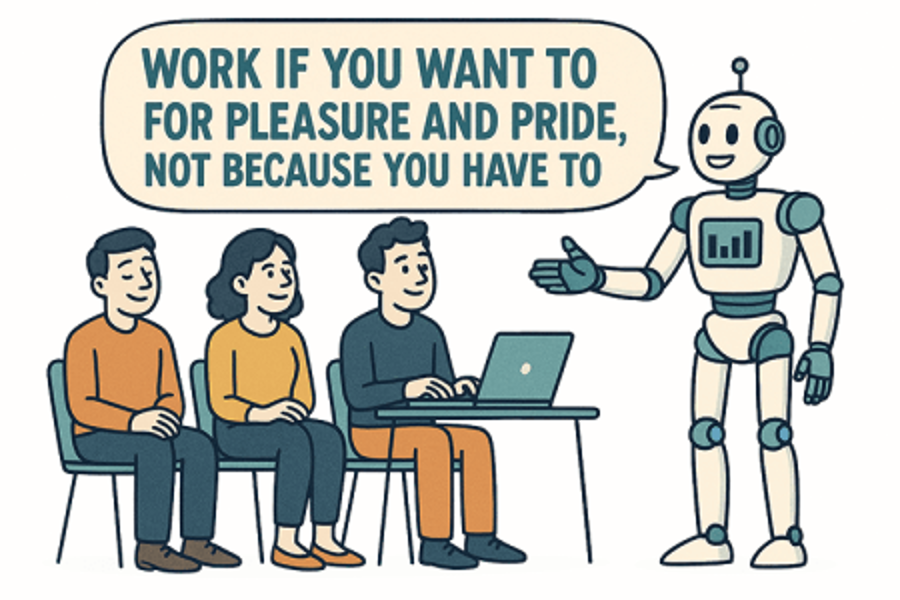
Key Question of Genesis:
Will we become more like them, or will they become more like us?
On Chapter Eight on Strategy, a key question that was introduced in earlier chapters is resolved, at least somewhat, by the authors agreement on the best answer.
To our minds, one question must define our human strategy in this new age of reckoning. That question is this: Will we become more like them, or will they become more like us?
Id. 184-185
The authors then discuss possible redesigns of the human form, including implants and DNA alterations, so we could be more like them. Fortunately, they agree that “extreme self-redesign may not be necessary and is anyway “generally undesirable.” They point out that:
“‘Upgrading’ ourselves biologically might backfire to become a greater limitation on ourselves. . . . If we are unwilling or unable to become more like them, we must, while we are able, find ways to make them more like us.Towards this end, we need to apprise ourselves more fully not only of the essential and evolving nature of AI but also of humanity’s own nature, and we must attempt to encode these understandings in our machines. If we are to entwine ourselves with these non-human beings, and yet retain our independent humanity, these efforts are essential.”
Id. at 190.
I concur with their opinion: Know Thyself.
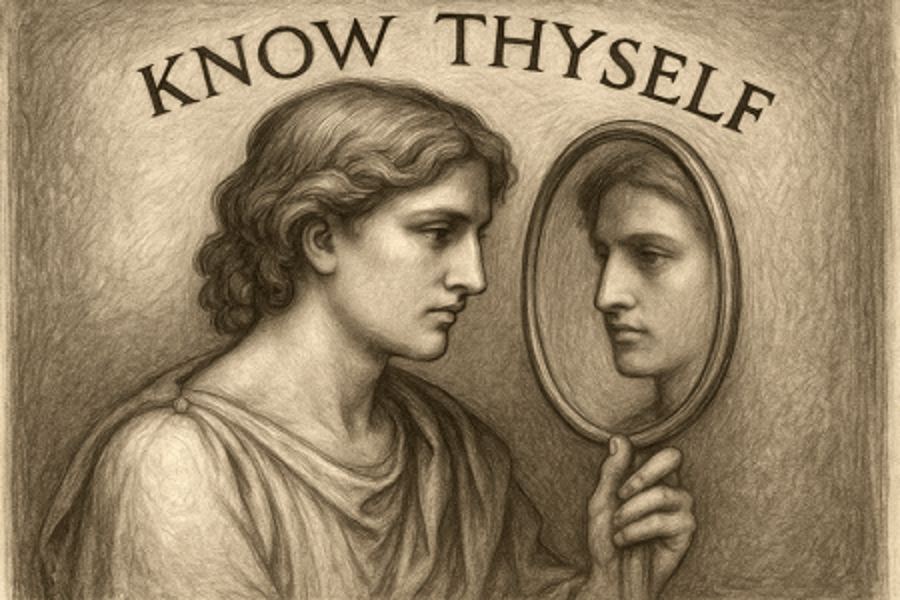
The Book’s Conclusion
The concluding paragraphs to Genesis at page 218 are clear, accent free, and very well written. They represent the last few days of the writing and life of Henry Kissinger. These words ring the bell for a new beginning for all mankind:
Neither blind faith nor unjustified fear can form the basis of an effective strategy; one needs self-doubt to have knowledge, but self-confidence to act. Indeed, in the age of AI, this is all the more urgent. We must try to understand the challenges that AI will present even as we lack the prior exposure or the essential experience to guarantee the accuracy of our comprehension. And even as we navigate this daunting task, we must also, to avoid a passive future, surmount the many difficulties already
While some may view this moment as humanity’s final act, we perceive instead a new beginning. The cycle of creation—technological, biological, sociological, political—is entering a new phase. That phase may operate under new paradigms of, among other things, logic, faith, and time. With sober optimism, we may meet its genesis.
Id. at 218.

My Conclusion: Impressive Man, Impressive Book
I was impressed by the young Henry Kissinger who overcame severe handicaps, including being Jewish as a boy in Nazi German, escaping as an immigrant in a strange land, joining the U.S. Army, and then, a few years later, fighting on the front lines as an intelligence scout, helping liberate a concentration camp, and then hunting down and prosecuting Gestapo criminals.
I was impressed by Kissinger’s intellectual curiosity and breadth of knowledge, which caused his technology co-authors to label him, in awe, a polymath.
I was in awe of Henry’s relentless writing outlet that continued to the last few days of his very long, one-hundred-year life. Physically spent but mentally as sharp as a tack. Incredible.
I was impressed by Kissinger’s unique insights and warnings about the impact of AI on humanity, both psychological and geopolitical.
Finally, I was impressed by Henry Kissinger’s hope, which I share, about the great potential for good of an ethically aligned, superintelligent AI, and the chance, if we work hard, that it will help humanity to achieve a far better future.
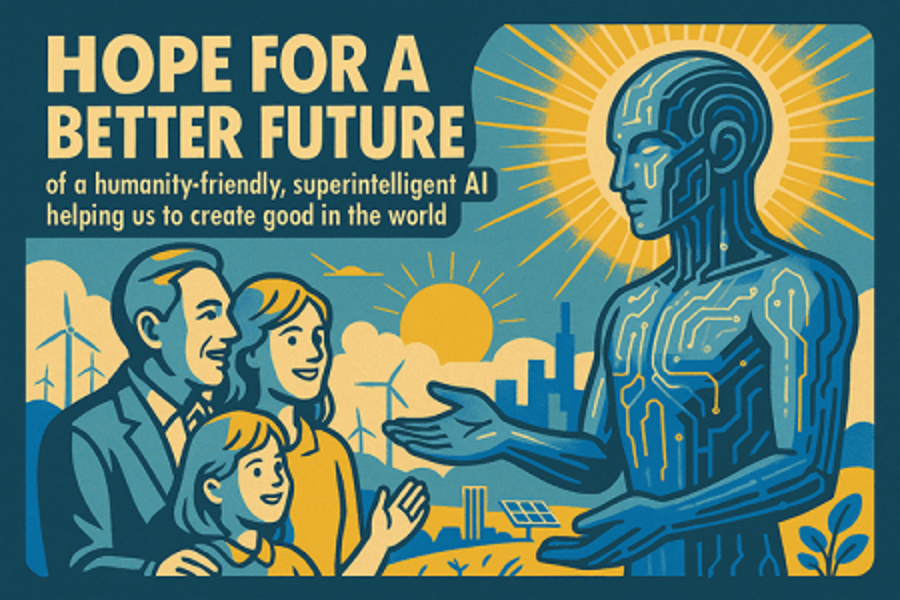
As usual I provide an AI podcast where two young techie AIs share their slant on things. Echoes of AI: Henry Kissinger and His Last Book – GENESIS: Artificial Intelligence, Hope, and the Human Spirit.” Two Google Gemini AIs generated a 16-minute podcast talking about this article. They wrote the podcast, not me.
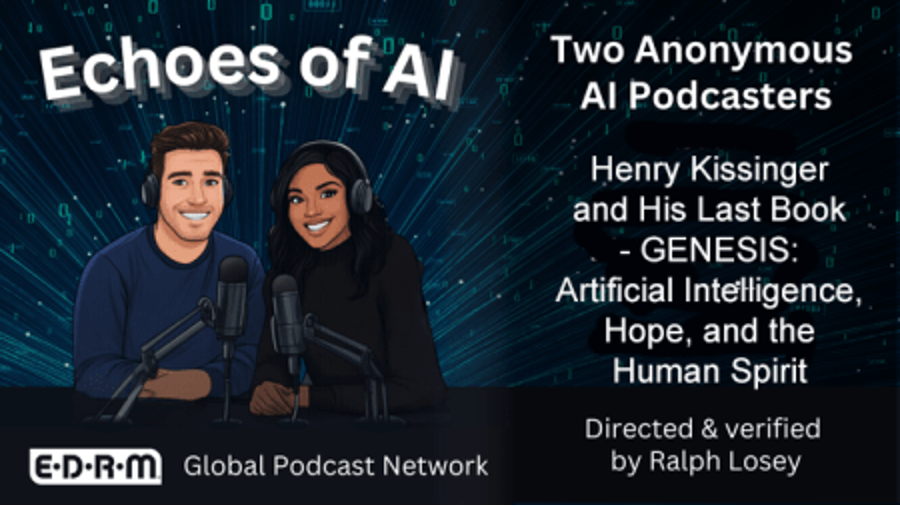
Ralph Losey Copyright 2025 – All Rights Reserved
Assisted by GAI and LLM Technologies per EDRM GAI and LLM Policy.


